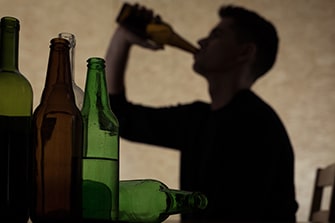Is There a Medication to Stop Drinking?
While there is no magic medication to stop drinking, there are medications to help you along your journey in early recovery. Overcoming alcoholism is much more than just abstaining from alcohol — it is a process that involves behavioral therapy, holistic therapy, evidence-based treatments, and medication. All of these things work together to put you on the best track toward long-term recovery.
Medication-Assisted Detox
Alcohol is one of the most dangerous substances from which to detox due to its potentially deadly withdrawal symptoms. According to MedLine, these withdrawal symptoms most often occur within 48 to 96 hours after the last drink. But, they may occur 7 to 10 days after the last drink. Withdrawal symptoms from alcohol include:
- Insomnia
- Anxiety
- Nausea
- Vomiting
- Headache
- Severe cravings
- Heart palpitations
- Hallucinations
- Seizures
- Delirium tremens (DTs)
If an individual suffering from alcohol use disorder attempts to become sober on their own, they run the risk of coma or death due to delirium tremens. Delirium tremens is a condition caused by a sudden change to the nervous system (in this case, due to the absence of alcohol) and can cause coma or death.
With medication-assisted detox, an individual will receive around-the-clock care from specially trained medical professionals. At Cliffside Malibu, we employ an on-site addictionologist who specializes in addiction and it’s related symptoms. By receiving medication and medical care for these difficult symptoms, an individual will be more likely to retain information learned in therapy and be on the best path to long-term recovery.
Drinking Deterrent
Medication to stop drinking includes a drinking deterrent called Disulfiram. It was the first medicine approved for the treatment of alcohol abuse. Disulfiram works by causing a severe adverse reaction when an individual consumes alcohol after taking the medication. It works by making the individual extremely sick to the point of vomiting. By creating a behavioral pattern with the brain to equate alcohol with sickness, it can work to create a drinking deterrent. It can be thought of as an extra cushion during early recovery since most relapses happen within the first 90 days of becoming sober.
Cravings Blocker
One of the longest-lasting symptoms of alcohol abuse is cravings. Fighting cravings can be a life-long battle since they can be experienced at any time without warning. When an individual receives treatment for addiction, keeps up with their aftercare, puts self-care as a priority, and leans on their support, they will have a greater chance of fighting these cravings successfully. However, before an individual has this experience under their belts, they may need medical intervention to help them fight their cravings for alcohol.
According to Medline, Naltrexone is used along with counseling and social support to help people who have stopped drinking alcohol and using street drugs continue to avoid drinking or using drugs. Naltrexone should not be used to treat people who are still using street drugs or drinking large amounts of alcohol. Naltrexone is in a class of medications called opiate antagonists. It works by decreasing the craving for alcohol and blocking the effects of opiate medications and opioid street drugs.
Withdrawal Symptom Discomfort
When an individual quits drinking alcohol, there are many emotional and physical discomforts that come along with it. As outlined above, these withdrawal symptoms are extremely uncomfortable and debilitating to the point of coma or death. They are also nearly impossible to experience alone successfully without relapsing.
American Family Physician states that Acamprosate has been used in Europe for the treatment of alcohol dependency since 1989. In 2004, it became the third drug to receive approval from the U.S. Food and Drug Administration for alcohol use disorder, following disulfiram and naltrexone.
Acamprosate is another medication to stop drinking. It is a structural analog of γ-aminobutyric acid (GABA). It is thought to decrease alcohol intake by affecting calcium channels and modifying transmission along GABA and glutamine pathways in the brain, which may result in decreased positive reinforcement of alcohol intake and decreased withdrawal cravings.
Do They Work?
As mentioned, there is no magic pill to help individuals successfully quit drinking. However, with the help of treatment and various medications, you have much better chances of long-term recovery. In fact, according to alcohol.org, around 20 – 25 percent of people who receive medication and therapy will recover from alcoholism and never touch alcohol again. A further 10 percent will recover and only drink alcohol in moderation or very occasionally. Unfortunately, the relapse rate for alcoholism is high, especially in the first 12-months, which makes therapy and aftercare important for long-term recovery.
About Cliffside Malibu
It is almost impossible to successfully quit drinking in the long-term without the help of therapy, medication, and support. The safest and most comfortable way to stop drinking is to start a treatment program and yield the best long-term results.
Since no two addictions are the same, Cliffside Malibu offers an individualized treatment plan for every client. We are committed to providing evidence-based treatment through a continuum of care model including medically supervised detox, residential treatment, day treatment, and outpatient services. Our program also includes family therapy and holistic therapy, as well. Whether an individual is suffering from substance abuse and/or alcohol addiction, our programs are structured to create a supportive environment where healing can begin.
In addition to world-class treatment, Cliffside Malibu offers luxury accommodations, a serene environment, five-star dining, and plentiful amenities. We understand that addiction treatment is a rigorous process. Therefore, we provide for your comfort and relaxation at every turn, allowing you to rejuvenate, and meet the demands of treatment with your greatest energy and attention.
For more information on Cliffside Malibu, visit cliffsidemalibu.com
